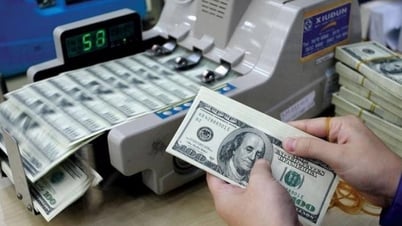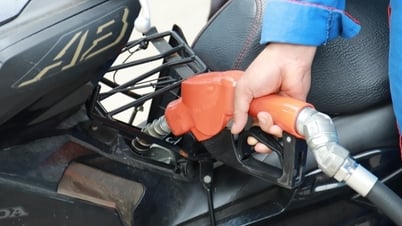Handling collateral: "It seems easy but it's not"
On the morning of May 27, at the workshop with the theme "Dealing with bad debt: What is the harmonious solution?", Mr. Do Thien Anh Tuan - lecturer at the Fulbright School of Public Policy and Management - said that collateral only has real value when it can be seized and handled quickly, transparently and legally if the borrower is unable to repay the debt.
According to him, collateral plays a key role in controlling credit risks and promoting loan expansion. This is the "safety valve" that helps banks feel secure in providing capital, while contributing to maintaining stability in the financial market.
Also at the conference, Mr. Le Hoang Chau, Chairman of the Ho Chi Minh City Real Estate Association (HoREA), said that we should not have the illusion that bad debt can be reduced to 0%. In a market economy , bad debt is an inevitable consequence. The problem is to control it at an acceptable level, which in Vietnam is about 3%.

Mr. Le Hoang Chau - Chairman of Ho Chi Minh City Real Estate Association (Photo: BTC).
According to Mr. Chau, to thoroughly handle bad debt, a transparent and synchronous legal system is needed to facilitate the circulation of assets, thereby clearing cash flow and restoring businesses' debt repayment capacity.
He emphasized that the root of the current bad debt problem lies in two major bottlenecks: legal problems and market risks. He cited that about 70% of the difficulties of the real estate market stem from legal problems. Many projects are stalled due to incomplete procedures, unable to transfer or foreclose, leading to cash flow blockage. As a result, businesses lose the ability to repay debts, increasing bad debts and putting pressure on the financial and banking system.
Lawyer Le Trung Phat - Director of Le Trung Phat Law Firm (Ho Chi Minh City Bar Association) - said that handling secured assets seems simple but in reality is very complicated because it involves many legal issues that, once they arise, must be resolved to the end.
According to him, banks lending and accepting mortgages using real estate may seem simple at first glance, but it still has many potential risks, especially for uncooperative customers who are unable to repay their debts.
Even when the bank has the judgment and the decision to execute the judgment in hand, the process of recovering assets can still be prolonged due to disputes with third parties. For example, when the borrower mortgages the house and land and then leases it or lets it to others for use, leading to the arising of extra-contractual rights.
Therefore, bad debt settlement needs to be placed in a harmonious overall balance between the rights of the mortgagee, the obligations of the borrower and the interests of the related parties.
Need a special mechanism to handle bad debt
Discussing solutions to bad debt, expert Do Thien Anh Tuan said that it is necessary to ensure that the mortgage contract has a clear agreement on the right to handle the property without going through court, i.e. the "power of sale" mechanism. This agreement must detail the notification procedure, valuation, processing time and the remaining rights of the borrower after the property is sold.
The asset handling process must be transparent, notified to borrowers in writing, and facilitate them to proactively repay their debts or find a transfer partner to achieve a better price.
Asset valuations should reflect fair market value and be subject to independent oversight to avoid losses to borrowers. If not through a public auction, transfers should be made through a transparent exchange, with information about the sale price, buyer and transaction clearly disclosed.

Economist Do Thien Anh Tuan (Photo: Nhat Quang).
In addition, the borrower must be assured of the right to receive the remaining balance after paying the debt and expenses, and even if there is no remaining value, it must be notified to avoid complaints. At the same time, related parties such as co-owners, legal tenants or guarantors must also be notified to exercise their rights and obligations.
Mr. Tuan proposed to legalize effective contents from Resolution 42 of 2017 on bad debt handling, ensuring the bank's right to legally seize assets while still protecting the borrower's property rights.
The amendment of the Law on Credit Institutions needs to focus on balancing interests, thereby increasing the ability to prevent risks for banks, helping borrowers reduce capital costs and improving access to credit for the entire economy.
Also at the workshop, the HoREA representative emphasized that bad debt settlement is not only about recovering capital but also an opportunity to restore the market. The government needs a specific, drastic and flexible mechanism to help recover debt, restore projects, save businesses and save jobs. This must be a comprehensive approach, not just dealing with the consequences.
One of the major bottlenecks today is the legality related to collateral. Many projects are stuck in procedures and legal disputes, making it impossible for banks to foreclose and for businesses to restructure.
Therefore, it is necessary to complete the legal framework for handling secured assets in a transparent manner, shortening the process, allowing auctions or project transfers in a public and convenient manner.
The association proposed the establishment of a central-level interdisciplinary working group to review and classify each group of stalled real estate projects and find appropriate solutions. At the same time, it is necessary to create conditions for feasible projects to access flexible credit capital, in order to restore cash flow, complete projects, repay bank debts and contribute back to the economy. The above problem needs a synchronous solution, with the participation of the entire political system.
Source: https://dantri.com.vn/kinh-doanh/ong-le-hoang-chau-khong-nen-ao-tuong-no-xau-co-the-ve-0-20250527144958258.htm


![[Photo] General Secretary To Lam works with the Central Policy and Strategy Committee](https://vphoto.vietnam.vn/thumb/1200x675/vietnam/resource/IMAGE/2025/5/28/7b31a656d8a148d4b7e7ca66463a6894)

![[Photo] Prime Minister Pham Minh Chinh receives a bipartisan delegation of US House of Representatives](https://vphoto.vietnam.vn/thumb/1200x675/vietnam/resource/IMAGE/2025/5/28/468e61546b664d3f98dc75f6a3c2c880)
![[Photo] 12th grade students say goodbye at the closing ceremony, preparing to embark on a new journey](https://vphoto.vietnam.vn/thumb/1200x675/vietnam/resource/IMAGE/2025/5/28/42ac3d300d214e7b8db4a03feeed3f6a)

![[Photo] Vietnamese and Hungarian leaders attend the opening of the exhibition by photographer Bozoky Dezso](https://vphoto.vietnam.vn/thumb/1200x675/vietnam/resource/IMAGE/2025/5/28/b478be84f13042aebc74e077c4756e4b)




















































































Comment (0)